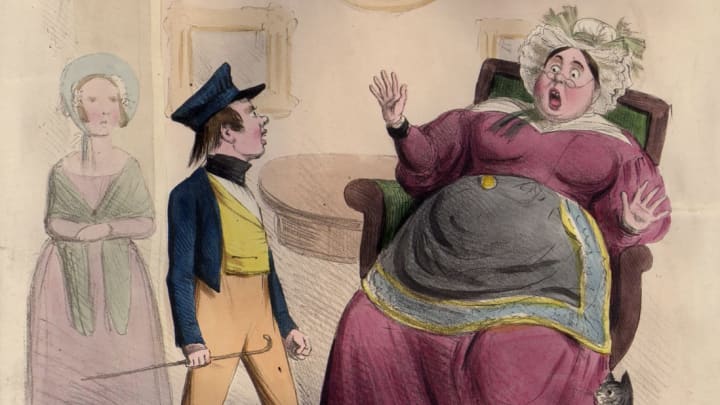Gobsmacked people commonly say “Wow!” or “Oh!” or “Holy excrement!” But shock, dismay, and astonishment are such common experiences that English has a plethora of exclamations to shout when taken aback. If you’re easily startled or just need some alternatives to “By the hammer of Thor!” and “Damn!,” read on for some old-timey outbursts.
1. and 2. Gup and Gip
Gup was a word directed in anger toward a horse back in the 1500s. Like many exclamations, gup drifted toward surprise over the years. Both meanings have also been conveyed by the word gip.
3. Holy Pretzel
As we learned from Burt Ward’s portrayal of the boy wonder Robin in the 1960s, any word can be an exclamation of astonishment if paired with holy, including this salty snack. Green’s Dictionary of Slang (GDoS) records this one in Frederick Kohner’s 1963 book The Affairs of Gidget: “Holy pretzel! My face got aflame like paprika.”
4. I'll Be Jitterbugged
According to Green's, Claude McKay used this term in his 1948 book Harlem Glory: A Fragment of American Life: “Suddenly he said: ‘I’ll be jitterbugged [...] Why, if it ain’t the big Buster himself.’” This meaning deserves wider use, as we could always use another word like gobsmacked.
5. Stiffen the Wombats
A number of strange-sounding Australian exclamations mentioned in Sidney J. Baker’s 1945 book The Australian Language deserve a comeback: “Here are some well-established variations on the theme to show that we have not been idle even in simple matters: speed the wombats! stiffen the lizards! stiffen the snakes! and stiffen the wombats!”
6. and 7. My Elbow and My Wig
Green's records my elbow in the UK since the early 1900s: It’s a euphemistic version of “My ass!” This is a natural expression since, according to idiom, these are the two most easily confused body parts. A similar expression is “My wig!” Sometimes folks get a little more verbose with this one, yelling, “My wig and whiskers!” or “My wigs and eyes!” The short version appeared in 1848, in Charles Dickens’s Oliver Twist: “‘Oh my wig, my wig!’ cried Master Charles Bates.”
8. Piminy
Quite a few of these terms are minced oaths, which turn God and Jesus into more acceptable terms. This one is a euphemism squared. Piminy is an alternation of Jiminy, which has been used since the early 1800s (especially in the form Jiminy Christmas) to avoid saying Jesus Christ. In 1912, an article from Ohio’s Newark Advocate used the term in an example presumably designed to mimic a regional accent: “Jumping piminy, wat a hevy trunk.”
9. Zookers
Speaking of minced oaths, zookers is another, found in print since the 1600s. This is one of several variations of gadzooks, such as zooks, gadzookers, zoodikers, and zoonters. All these words mean “By God!” but exist due to the taboo surrounding God’s name. In William Harrison Ainsworth’s 1854 novel The Flitch of Bacon, the term is used to express dismay at an alarming marital situation: “I've ... Seen him make love to another woman.’ ‘To Mrs. Nettlebed?’ ‘Zookers! no.’”
10. Fishhooks
In Vermont, “Oh fishhooks!” is an exclamation of surprise, according to the Dictionary of American Regional English (DARE).
11. Gosh All Hemlock
DARE provides yet another testimony to English’s exclamatory versatility, quoting a 1959 book on the history of Vermont, which lists a colorful assortment of expressions: “Gosh all Fiddlesticks! ... Gosh all Filox! ... Gosh all Firelocks! ... Gosh all Frighty! ... Gosh all Fishhooks! ... Gosh all Hemlock! ... Gosh all Hemlocks and chew spruce gum! ... Gosh all Tarnation! ... Gosh all sufficiency!”
This article was originally published in 2017; it has been updated for 2022.
